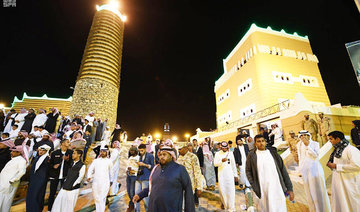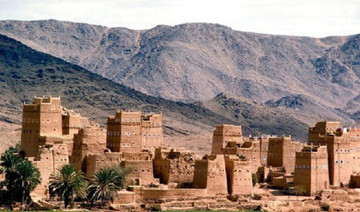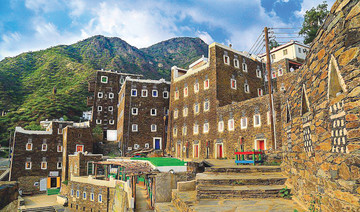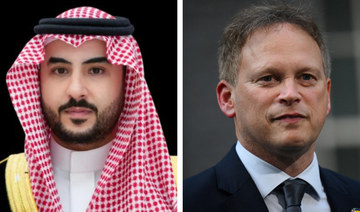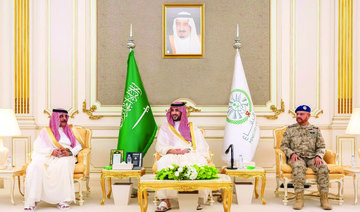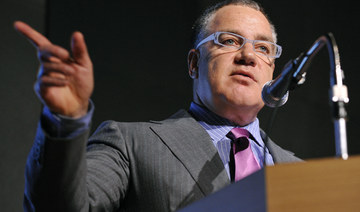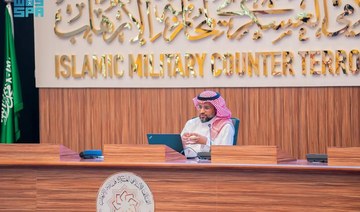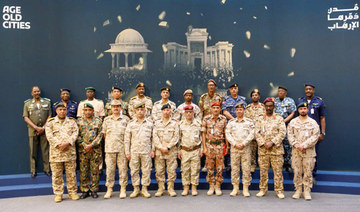JEDDAH: To an outsider, the mountains surrounding the center of Khat, in Al-Majardah province in northwestern Asir, appear impassable — but for the gifted people who settled there, the peaks provided a sanctuary for their historic “hanging villages.” Now a new tourist window is opening on the region’s hanging villages, about 180km from Abha, which are among the most striking sights in Saudi Arabia. While touring the region, SPA found that history comes to life on a journey of discovery in the villages.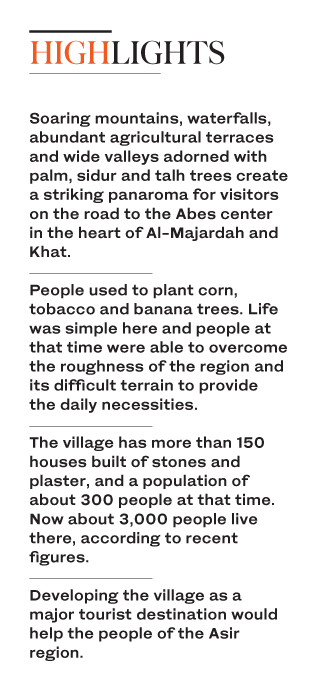
Departing from the city of Abha on a tourist road to Taif, and passing through the provinces of Tanomag and Al-Namas, SPA visited the village of Al-Khadra, in the north of Al-Namas Province. The trip included a wide variety of attractive sites, ranging from high mountains covered with juniper trees to steep slopes, as well as various agricultural terraces, which are considered among the most important tourist destinations in the whole region.
Soaring mountains, waterfalls, abundant agricultural terraces and wide valleys adorned with palm, sidur and talh trees create a striking panaroma for visitors on the road to the Abes center in the heart of Al-Majardah and Khat. There, a number of residents were waiting to act as guides to the hanging villages.
The residents highlighted the need for a four-wheel-drive vehicle to reach the village of Al-Sumayd. Vehicles were provided by Abdul Rahman Mohammed Al-Sumaydi, a Khat resident who described the center’s history and explained the network of old roads used to access it. Al-Sumaydi is looking forward to paving the road leading to the village to protect it from flooding. He explained the  development of the region to encourage tourism.
development of the region to encourage tourism.
The road crosses from the Al-Hussein area through the Qaa’, then passes through Mizher Mountain and the villages of the Al-Muhammad tribes of Bani Amr and ends in the village of Rahwat Al-Sumayd, which lies on the summit of the Khat mountains, more than 1,500 meters above sea level.
Al-Sumaydi said the ancient village included mountain-top palaces and castles that house archaeological artefacts and rock inscriptions. Agricultural terraces around the village offered a living for people at the time.
“The village was characterized by the basins dug in the core of the black rock, which vary in length, width and depth,” he said. “They are the main source of potable water for the people of the village, by filling the tanks dug in the ground with rainwater. That water was also used for irrigation of agricultural terraces and for watering livestock.”
Mohammed bin Ali bin Dahman Al-Shahri, 70, shared memories of his childhood growing up in the hanging village.
“I spent two decades in this place amid the houses built with stones, mud and wood, surrounded by farms that were the source of our livelihood at the time. People used to plant corn, tobacco and banana trees. Life was simple here and people at that time were able to overcome the roughness of the region and its difficult terrain to provide the daily necessities,” he said.
The village has more than 150 houses built of stones and plaster, and a population of about 300 people at that time. No w about 3,000 people live there, according to recent figures. “The village’s isolation and limited access forced residents to travel to nearby centers and neighboring provinces for essential services,” he said.
w about 3,000 people live there, according to recent figures. “The village’s isolation and limited access forced residents to travel to nearby centers and neighboring provinces for essential services,” he said.
Al-Shahri said he hoped the village would receive help to create public services such as roads.
Developing the village as a major tourist destination would help the people of the Asir region, in particular, and the Kingdom in general, he said.
The ‘hanging villages’ atop Assiri mountains bare marks of early civilization
The ‘hanging villages’ atop Assiri mountains bare marks of early civilization
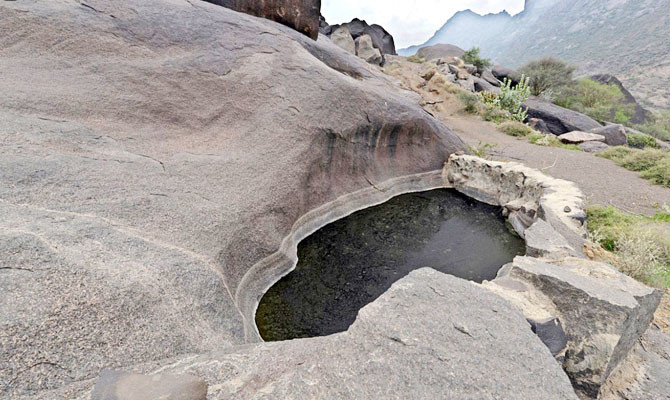
- The region opens a new window for visitors seeking tourism in this area, given its attractive nature, between high mountain lands, covered in Juniper trees
- Developing the village as a major tourist destination would help the people of the Asir region
Saudi defense minister meets with Burkinabe counterpart
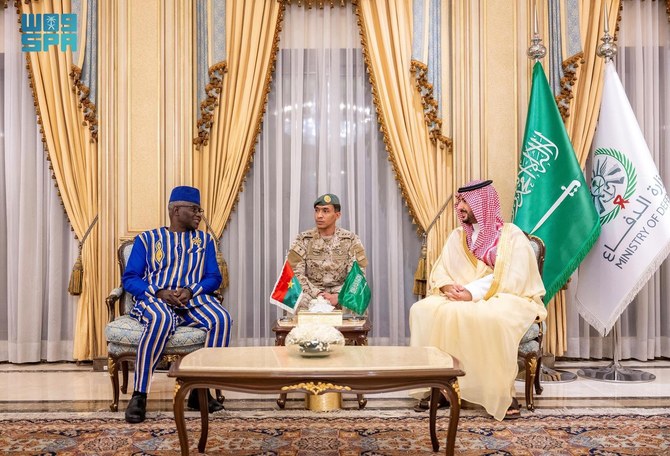
- The ministers discussed regional and international developments and efforts made with regard to them
RIYADH: Saudi Arabia’s Defense Minister Prince Khalid bin Salman met with Burkina Faso’s Minister of Defense and Veterans Affairs Kassoum Coulibaly in Riyadh on Sunday.
During the meeting, relations between the two countries and military and defense cooperation were discussed.
The ministers also discussed regional and international developments and efforts made with regard to them.
Sara Philby, granddaughter of iconic explorer Abdullah Philby, recounts his influence on her life and pursuits
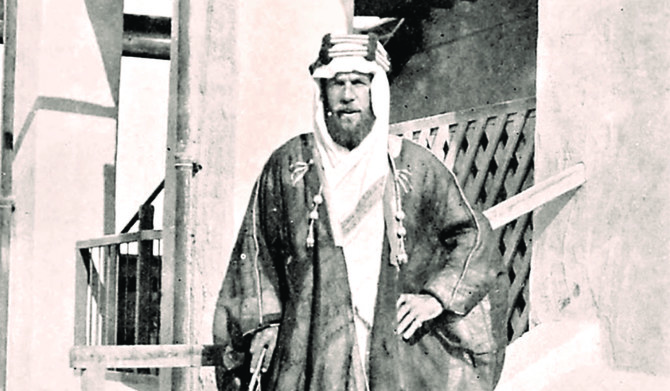
- Some of the specimens he has gathered are held in the British Museum in London,” Sara told Arab News
JEDDAH: As the granddaughter of the renowned explorer Abdullah Philby, Dr. Sara Faris Abdullah Philby’s decision to pursue her medical education in Saudi Arabia echoes the pioneering spirit that defined her grandfather’s historic exploration of the Arabian Peninsula.
In honoring her family’s heritage, Sara follows in the footsteps of Sheikh Abdullah Philby, whose multifaceted contributions continue to inspire generations.
“My grandfather led a truly remarkable life,” Sara told Arab News. “From his legendary expeditions to his conversion to Islam, his influence extends far beyond our family.”

She said he has had a profound impact on her life: “Simply contemplating his image fills me with warmth and optimism. My grandfather, Abdullah, possessed a rare combination of traits — uniqueness, dedication, and punctuality — that set him apart. As an explorer and writer, he navigated uncharted territories with grace and determination, leaving an indelible mark on history.”
Who was Abdullah Philby?
Harry St. John Bridger Philby, an explorer and Arabist, received his education at Westminster School and Trinity College, Cambridge. After joining the Indian Civil Service, where he mastered several languages including Urdu, Punjabi, Baluchi, Persian, and Arabic, Philby was recruited to Basra in Mesopotamia (modern Iraq) in 1915 by Percy Cox. His service in Baghdad and Basra eventually led to a mission to meet Ibn Saud in Riyadh, a journey across Arabia for which he was awarded the Royal Geographical Society Founders Medal.
HIGHLIGHTS
• Harry St. John Bridger Philby, or Sheikh Abdullah, left behind a legacy as one of the greatest Arabian explorers.
• Over three decades, he embarked on extraordinary journeys, notably crossing the Empty Quarter in 1932, a feat that tested the limits of endurance.
• His granddaughter Dr. Sara Philby pursued her education in Alfaisal University in Riyadh. • After completing a bachelor’s degree in medicine and another in surgery, she was drawn to the intricate world of embryology.
From their first encounter, Philby was captivated by the magnetic personality of Ibn Saud, and the two formed a friendship that lasted 36 years. Despite his involvement in business and writing, Philby’s true passion lay in exploration. Over three decades, he embarked on extraordinary journeys, notably crossing the Empty Quarter in 1932, a feat that tested the limits of endurance.
Traveling by camel and later by Land Rover, Philby meticulously documented his expeditions, recording place names, temperatures, compass bearings, and more. His scholarly contributions earned him high honors from academic societies worldwide.

“He lived to witness a golden chapter in his life, marked by numerous creations of detailed maps, priceless books including unmatched details of his journeys, and contributions to several fields such as history, politics, and wildlife. Some of the specimens he has gathered are held in the British Museum in London,” Sara told Arab News.
As a trusted advisor to Ibn Saud, Philby’s insights and candid opinions were valued by the monarch. His conversion to Islam in 1930 further strengthened their bond, and Philby was bestowed the name Sheikh Abdullah.
In 1960, at the age of 75, Philby died during a visit to Beirut, leaving behind a legacy as one of the greatest Arabian explorers. He was buried in the Muslim graveyard at El-Bouchara, with his son Kim’s inscription on his grave marking his profound impact on exploration and scholarship.
For me, honoring my grandfather’s legacy is not merely a goal but a life purpose.
Dr. Sara Faris abdullah Philby, Alfaisal University graduate
“(He) left behind a spectacular life story and a loving family, led by my beloved uncle Khaled Philby and my beloved father Faris Philby, who would adore him for the rest of time,” Sara said.
His involvement in Arabia during World War I, his close relationship with Ibn Saud, and his pivotal role in the Arab Revolt and the creation of Saudi Arabia highlight his enduring influence on the region's history and culture.
Sara explained that her grandfather’s legacy continues to influence her approach in life and her career in medicine: “His interests in exploration and travel might differ from my academic interests in medicine and clinical embryology. However, that doesn’t diminish his huge impact on my educational decisions.
“With his legacy as a beacon, I am motivated to continuously push myself to new heights, embracing challenges and opportunities for growth along the way,” she added. “His love for history, the desert, maps, and wildlife will forever capture my heart, despite my academic pathway heading somewhere different.”
Sara pursued her education in Alfaisal University in Riyadh. After completing a bachelor’s degree in medicine and another in surgery, she was drawn to the intricate world of embryology.
“My interest in this field stemmed from a personal fascination with reading books on embryology and reproductive sciences,” she noted. “Moreover, I was deeply inspired by the noble goals of this discipline, particularly in addressing infertility and assisting couples in starting families according to God’s will.”
Sara’s religious and cultural background plays a pivotal role in shaping her career aspirations. “As a Muslim, my faith serves as a guiding light,” she affirms. “Islam’s teachings emphasize compassion and kindness, influencing my academic pursuits. The profound references to embryology in the Holy Qur’an have deepened my interest in this field.
“The Holy Qur’an beautifully elucidates the stages of human embryonic development in multiple verses,” she noted. “This further solidified my conviction to pursue a career in clinical embryology and reproductive biology.”
Following her passion, this year Sara graduated from Alfaisal University with a master’s degree in biomedical sciences, specializing in clinical embryology and reproductive biology, achieving first honors.
Speaking about the enriching experience at the university, she said: “Alfaisal University has been an integral part of my life for many educationally fruitful years … I am hopeful for its continued success and prosperity in the future.”
Her journey through academia had its own challenges: “The rigorous demands of the field required unwavering commitment and patience. However, these experiences have shaped me into the person I am today, instilling in me a sense of resilience and determination.
“Embrace the journey, stay true to yourself, and remain dedicated to your goals,” she advises aspiring professionals. “Believe in your abilities and seize the opportunities that come your way.”
Balancing personal aspirations with her family’s legacy is a central theme for Sara. “I place great importance on aligning my personal aspirations with the expectations associated with my family’s legacy,” she explains. “By staying true to myself and honoring my family’s heritage, I find harmony in pursuing my goals.”
As she navigates the complexities of academia and embarks on her own path of exploration, Sara remains steadfast in her commitment to honoring the rich heritage passed down to her by her grandfather.
“For me, honoring my grandfather’s legacy is not merely a goal but a life purpose,” Sara said.
Jeddah to host ALECSO Executive Council, General Conference meetings

- Representatives from 22 Arab countries set to attend
RIYADH: Jeddah is to host the Executive Council and General Conference of the Arab League Educational, Cultural and Scientific Organization.
Ministers and heads of national committees from 22 Arab countries will attend the event, which takes place from May 14-17 and highlights the Kingdom’s commitment to education, culture, and science, as well as its focus on strengthening ties with Arab and Islamic nations.
The event aligns with the directives of Prince Badr bin Abdullah bin Farhan, the Saudi minister of culture and chairman of the Saudi National Commission for Education, Culture and Science.
The Kingdom aims to play a more active role in regional organizations like ALECSO, helping to contribute to its mission while supporting education, culture and science within Arab societies, the Saudi Press Agency reported.
The 121st meeting of the Executive Council is scheduled for May 14-15, while the 27th General Conference will be held on May 17.
Organized by the Kingdom’s National Commission for Education, Culture and Science, more than 145 representatives from Arab countries and related organizations are expected to participate in the meetings.
The General Conference will hold working sessions aimed at improving ALECSO’s programs and initiatives. This approach will seek to empower Arab societies by fostering scientific, educational, cultural, and communication projects that nurture a new generation of Arabs embracing their identity, language, and heritage, while aspiring toward a more innovative and sustainable future, the SPA added.
Saudi CEO to attend Gulf Creatives Conference at Harvard University
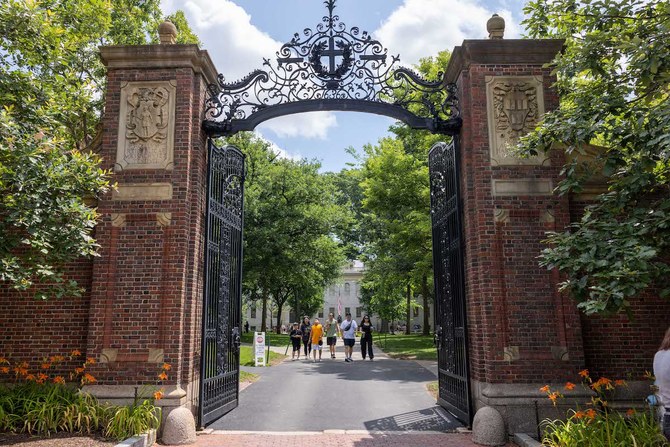
- Al-Fayyadh will articulate the hospital’s vision for the future of healthcare regionally and globally
RIYADH: Majid Ibrahim Al-Fayyadh, CEO of the King Faisal Specialist Hospital & Research Center, will take part in the Gulf Creatives Conference at Harvard University from May 10-12, Saudi Press Agency reported on Sunday.
The conference will be a platform for influential voices from the Arab Gulf nations within the US academic landscape to illuminate the region’s expertise and accomplishments across diverse fields while charting a course for the future.
The conference will draw together distinguished leaders from both public and private sectors across the GCC, embodying the region’s dynamic potential and innovative ethos in sectors including sports, the arts, media, entrepreneurship, technology, non-profit endeavors, public policy, and healthcare.
The event is organized by The Diwan, a student-run organization representing those studying at Ivy League universities.
The GCC event will host 24 discussion sessions and five workshops.
Discussions will cover public policy landscapes, innovation strategies, and the future landscape of healthcare, inviting active participation from all attendees.
During the event, Al-Fayyadh will deliver a keynote address spotlighting the center’s achievements and its pivotal role in advancing Saudi Arabia’s healthcare transformation journey.
Additionally, he will articulate the hospital’s vision for the future of healthcare regionally and globally, underscoring its commitment to innovation and excellence.
Al-Moghedi meets Gambia’s chief of defense staff in Banjul
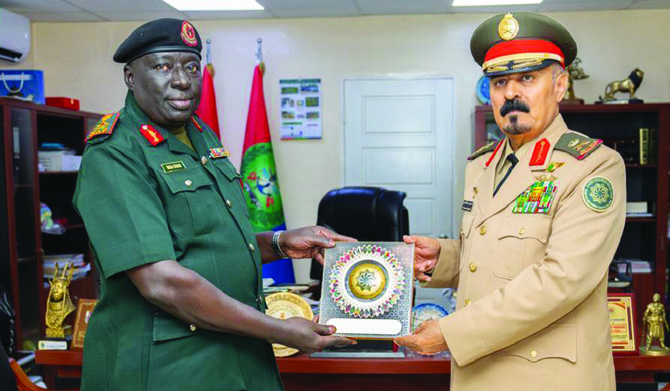
- The two men discussed bolstering cooperation between the Islamic coalition and the Gambia
BANJUL: Secretary-General of the Islamic Military Counterterrorism Coalition Maj. Gen. Mohammed bin Saeed Al-Moghedi recently met with Chief of Defense Staff of the Gambia Maj. Gen. Mamat O. Cham at the Islamic Summit Conference in Banjul, Saudi Press Agency reported on Sunday.
The two men discussed bolstering cooperation between the Islamic coalition and the Gambia.
Cham reviewed the Islamic coalition’s ideological, media, military and counterterrorism initiatives. He praised its efforts in combating terrorism and highlighted the Kingdom’s efforts in supporting the coalition since its establishment.












